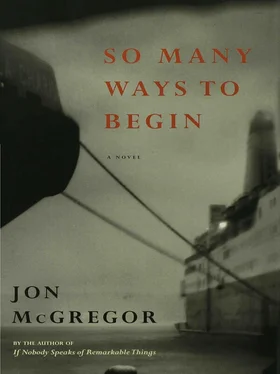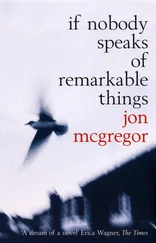Susan found her a job, not long afterwards, working in the canteen at the council offices, and although she said it was strange to be pouring teas again she seemed to get on well with the other people working there. It'll do for now, she said, when he asked how her first week had gone; at least until I get things sorted out with the university. They went out a few evenings each week — to the cinema, to a restaurant, for a drink after work — and they started to tackle the decorating in the rooms upstairs. They went to his mother's for Sunday lunch now and again, or had her round to theirs. He took her to visit Julia, and even though Julia was too ill to say very much, Eleanor said how glad she was to have gone. They spent long evenings talking, watching television, pulling off each other's clothes as they scrambled up the stairs. They had people round for dinner, and talked about work, politics, sport, the weather, the news. Things weren't quite as they'd expected, not yet, but they had all the time in the world for things to fall into place.
27 Model fishing boat, handmade c. 1905
Her father gave her the boat when she was no more than four or five years old. She could remember running from the kitchen to the front room one cold autumn evening, she said, the backs of her legs bright red and stinging, bruises rising blotchily beneath the skin on her arms, and her da looking down at her from his chair.
I can't remember what I'd done wrong, she said. Probably I didn't even know at the time; probably it was nothing more than my ma being in a short temper.
She stood and looked at her father, her small grubby fingers wiping her cheeks, wanting to turn around but not wanting to go back. She could hear her sister listening to music upstairs, and she could hear her mother turning the squeaking handle on the mangle in the kitchen, muttering and sighing as she crammed the wet clothes into it and choked out the water. She locked her arms around his leg and pressed her face against his hand.
That's my girl, he said, picking her up and setting her on his lap. You okay now? he asked. She thought for a moment, and nodded fiercely. Good girl, he said, smoothing down her short fair hair with his hand. Her mother had cut it again, roughly, and the sides were uneven and coarse, her fringe a slanted line across her forehead. The sun's got your hair again, hasn't it girl? he said, tracing the lines of blonde brought out of the mousey-brown by the sun. That'll be the Viking coming out of you, he said, smiling.
She'd liked the feel of his touch, she told David, the rough loose skin on his hand, the warmth of it. She'd liked it when he pinched her cheek and when he wiped her tears away with a stroke of his broad flat thumb.
Now then, he said. There's no need for all that crying, is there? Eleanor shook her head, shamefully. Would you like to see something special then, something your da's been saving for you? he said. She looked at him, not daring to nod, and he pulled a shabby cardboard box from the cupboard beside him, opening it up and peeling back the layers of crinkled yellow newspaper inside, lifting out the small model fishing boat and cradling it in his hands, feeling the scrapes and scratches which still pockmarked the hull, feeling like it could have been yesterday he was sailing this boat across the soap-sudded scullery floor while his mother scrubbed pans and sang high above him, remembering launching it off the edge of the worn back step, flipping it upside down and sending men and fish and ropes and sandwiches down into the endless ocean. He held the boat out towards her, straightening the unsteady mast and wiping it down with his handkerchief. It's an old fishing boat petal, he said. Your Granda used to go to sea on one like this. Look, see, there's the net for all the fishes, eh? He unfurled a knotted string net from the stern and draped it out across his thigh, sailing the boat across imaginary waves to his daughter, the net trailing across his oil-stained trousers, the blunt-pointed bow bucking and yawing into her outstretched hands. Do you think you can look after that for me then Eleanor? he asked. Will you keep it safe now? She looked up at him, holding the old wooden boat protectively against her chest, her eyes wide and clear, nodding solemnly. They heard the back door open, and her mother letting out a loud and weary sigh. Go on and play with that now, he whispered, gently pushing her forwards, and she slipped away to her room to sail the boat across the grey waters of a fraying rug, to cast weatherbeaten men into the hold and tip them back out into the sea.
Later, she heard her mother come up the stairs and, with a quick-thinking wisdom beyond her years, she sheltered the boat beneath the harbour of her over-hanging bedsheets before the door had even swung open. And there'll be no supper for you either my girl, so get yourself away into bed now, her mother said calmly. Eleanor undressed and got into bed without saying a word, and her mother closed the bedroom door. It was five o'clock, and she was already hungry. She closed her eyes against the daylight still flooding into the room. She listened to her father's voice, rumbling below the floorboards, and to her mother's brief muttering response. She stretched a hand out under the bed, finding and running her fingers over the gnarled and knotted wood of the model boat as she waited for sleep to come.
Sometimes, if he woke in the middle of the night and found himself alone in their bed, he would go downstairs and find Eleanor sitting on the sofa there, wide-eyed and unable to sleep, holding the model boat in her lap once more and stroking the grain of the wood. Go back to bed, she'd say, not looking at him, I'm fine. I can't sleep, that's all; it's nothing, I just can't sleep. He'd sit next to her, fetch her a glass of water, ask her if she wanted to talk, smooth her hair away from her face. You've got to work in the morning, she'd say. I'm fine, go back to bed. He'd ask her to come back to bed with him, to talk if she needed to talk, to lie down and close her eyes and come back to bed with him.
I'm fine, she'd say, leave me be. Go back to bed yourself.
28 Page torn from Aberdeen Press & Journal, crumpled, August 1968
Sometimes, if she was prompted, Eleanor would tell other people besides David about her life before she came to Coventry; Susan perhaps, or Susan's husband John, or one of David's colleagues from work, if the wine had been around the table a few times and she felt for once that no harm could come from it. You never tell us about Aberdeen, Susan would say, somewhere in the lull between main course and pudding; what's it like?
Aberdeen? she'd say. There's not all that much to tell. It was a bit colder than it is down here, there were fewer jobs about — what did you want to know?
Well, Susan would persist, I don't know. I mean, what did your parents do, and your brothers and sisters, what was your house like, that kind of thing.
And Eleanor would tell them about the small house in which all eight of them had lived, making a joke out of the bed-sharing and the outside toilet, the tin bath hanging on the wall, the belting for getting soot on the laundry that hung around the fireplace, making it all sound distant and unreal. She told them about her father's job in the shipyard, and her brothers leaving the house one by one to work in the merchant navy, the shipyard, the railways, the joiner's shop at the far end of town; and she told them about her own first job at the museum tea rooms. We didn't have much for entertainment, she told them once, mainly I had my head stuck in a book and just about the only place I could find quiet enough for reading was in the lav so long as it was warm enough. That got me in trouble as well, she said, laughing, filling her glass again, bawling out an imitation of one of her brothers — Mam! Ellie's been in there for hours, will ye tell her? — and lowering her head for a moment as she ran out of steam.
Читать дальше
Конец ознакомительного отрывка
Купить книгу











